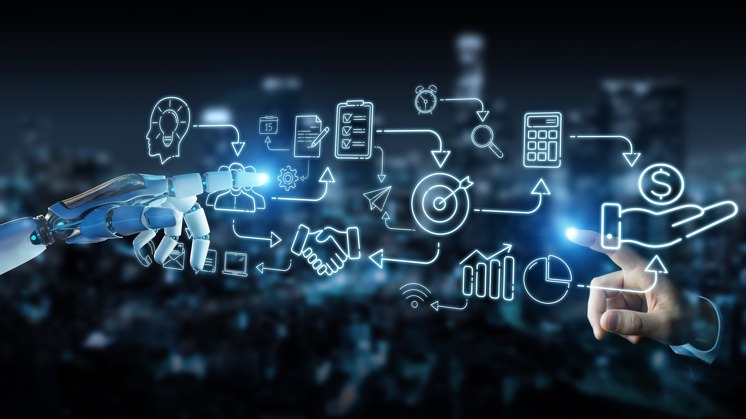In today’s rapidly evolving world, digital innovation is the driving force behind many of the groundbreaking changes we see across industries. From artificial intelligence (AI) and machine learning to the Internet of Things (IoT) and blockchain technology, digital innovation is transforming businesses, society, and the way we interact with the world. This article explores the concept of digital innovation, the technologies involved, and how they are reshaping industries and creating new opportunities for growth.

What Is Digital Innovation?
Digital innovation refers to the process of leveraging digital technologies to develop new or improved products, services, or business processes. It involves using the latest technological advancements to drive change, enhance productivity, and offer innovative solutions to meet evolving customer needs.
At its core, digital innovation goes beyond merely adopting technology. It’s about fostering a culture of creativity and experimentation, where businesses and individuals explore new ways of solving problems, improving efficiencies, and delivering value. It can involve anything from automating manual processes to building entirely new business models that capitalize on emerging technologies.
Key Technologies Driving Digital Innovation
The rapid advancement of several key technologies has been instrumental in driving digital innovation. These technologies enable businesses to rethink their operations, interact with customers in new ways, and create more personalized experiences. Below are some of the major technologies playing a pivotal role in digital innovation:
1. Artificial Intelligence (AI) and Machine Learning
Artificial Intelligence (AI) and machine learning (ML) are at the forefront of digital innovation. AI refers to the ability of machines to mimic human intelligence, while machine learning is a subset of AI that enables systems to learn from data and improve over time.
AI and ML are revolutionizing industries by enabling businesses to automate tasks, analyze large datasets, and predict future trends. For example, in the healthcare industry, AI-powered algorithms are used to assist with diagnostics, recommend personalized treatments, and even detect potential health risks before they become serious issues. Similarly, AI-driven chatbots and virtual assistants are transforming customer service by providing instant support and personalized interactions.
2. Internet of Things (IoT)
The Internet of Things (IoT) refers to the network of interconnected devices that communicate and share data with each other over the internet. These devices range from everyday household items like smart thermostats and wearable fitness trackers to industrial machines used in manufacturing and logistics.
IoT has created new possibilities for data collection, real-time monitoring, and automation across various industries. In agriculture, IoT devices are used to monitor soil moisture levels, track weather patterns, and optimize irrigation systems. In manufacturing, IoT-enabled sensors can detect equipment malfunctions before they occur, reducing downtime and improving operational efficiency.
3. Blockchain Technology
Blockchain technology is a decentralized and distributed ledger system that ensures secure and transparent transactions. Originally developed as the underlying technology for cryptocurrencies like Bitcoin, blockchain is now being explored for a variety of applications beyond digital currencies.
The transparency, immutability, and security features of blockchain make it ideal for industries such as finance, supply chain management, and healthcare. In finance, blockchain can streamline payment processes, reduce fraud, and eliminate the need for intermediaries. In supply chain management, blockchain is used to trace the journey of goods from production to delivery, ensuring greater transparency and accountability.
4. Cloud Computing
Cloud computing refers to the delivery of computing services (such as storage, processing power, and applications) over the internet. It allows businesses and individuals to access software and data remotely, reducing the need for physical infrastructure.
The flexibility, scalability, and cost-effectiveness of cloud computing have made it a critical enabler of digital innovation. Businesses can quickly scale their operations without worrying about maintaining costly hardware, and they can easily collaborate with teams across the globe. Cloud platforms also provide the foundation for technologies like AI, big data analytics, and IoT.
5. 5G Networks
The rollout of 5G networks is expected to revolutionize digital innovation by providing faster internet speeds, lower latency, and greater connectivity. 5G technology will enable more devices to be connected simultaneously, opening the door for new innovations in industries such as autonomous vehicles, telemedicine, and smart cities.
With 5G, real-time data exchange will become more efficient, allowing for more advanced applications in healthcare, transportation, and entertainment. For instance, autonomous vehicles will require 5G for real-time communication between vehicles and infrastructure, making it possible for self-driving cars to navigate safely and efficiently.
How Digital Innovation Is Impacting Industries
Digital innovation is transforming industries across the board, creating new business opportunities and reshaping traditional business models. Below are some examples of how digital innovation is impacting various sectors:
1. Healthcare
In healthcare, digital innovation is improving patient care, streamlining administrative processes, and enhancing the overall healthcare experience. Telemedicine, powered by digital platforms, has made healthcare more accessible, particularly for individuals in remote areas. AI algorithms are helping doctors make more accurate diagnoses and predict patient outcomes, while IoT devices are enabling real-time monitoring of chronic conditions.
Moreover, digital health records and blockchain technology are making it easier for healthcare providers to share patient data securely, ensuring better coordination of care.
2. Retail
The retail industry has been significantly impacted by digital innovation, particularly through the rise of e-commerce and personalized customer experiences. Retailers are using AI and machine learning to analyze customer data and provide personalized recommendations. Augmented reality (AR) is being used in online shopping to allow customers to visualize products in their homes before making a purchase.
Furthermore, the use of IoT devices in inventory management and supply chain operations has made it easier for retailers to optimize stock levels and improve delivery times.
3. Finance and Banking
Digital innovation is transforming the finance and banking sectors by enabling faster, more secure transactions and improving customer experiences. Blockchain technology has the potential to revolutionize payment systems, reducing transaction fees and ensuring greater transparency in financial transactions.
Fintech companies are also leveraging AI and big data to offer personalized financial advice, automate loan approvals, and detect fraud more effectively. Digital banking services, mobile payment platforms, and cryptocurrency have made banking more accessible to people worldwide.
4. Manufacturing and Supply Chain
In manufacturing, digital innovation is driving greater efficiency, reducing costs, and improving product quality. The use of AI, machine learning, and IoT devices allows manufacturers to optimize production schedules, predict maintenance needs, and improve supply chain logistics.
Digital technologies are also enabling greater customization in product manufacturing, allowing for mass customization and on-demand production, which improves customer satisfaction and reduces waste.
Challenges and Opportunities in Digital Innovation
While digital innovation offers numerous benefits, it also presents challenges. Some of the main challenges include the need for significant investment in technology, concerns about data privacy and security, and the potential for job displacement due to automation.
However, digital innovation also opens up a world of new opportunities. It has the potential to create new industries, enhance collaboration, and drive global economic growth. For businesses, embracing digital innovation is essential for staying competitive and meeting the demands of an increasingly tech-savvy customer base.
Conclusion
Digital innovation is reshaping the way businesses operate, how consumers interact with products and services, and the overall landscape of industries worldwide. With advancements in AI, IoT, blockchain, cloud computing, and 5G, the future of technology looks incredibly exciting. Businesses that embrace digital innovation will be better equipped to stay ahead of the competition, create new revenue streams, and offer improved experiences to customers. While challenges remain, the opportunities created by digital innovation are boundless, marking the beginning of a new era in technology and business.
Read More : The Age of Digital Innovation: Transforming Business and Society




